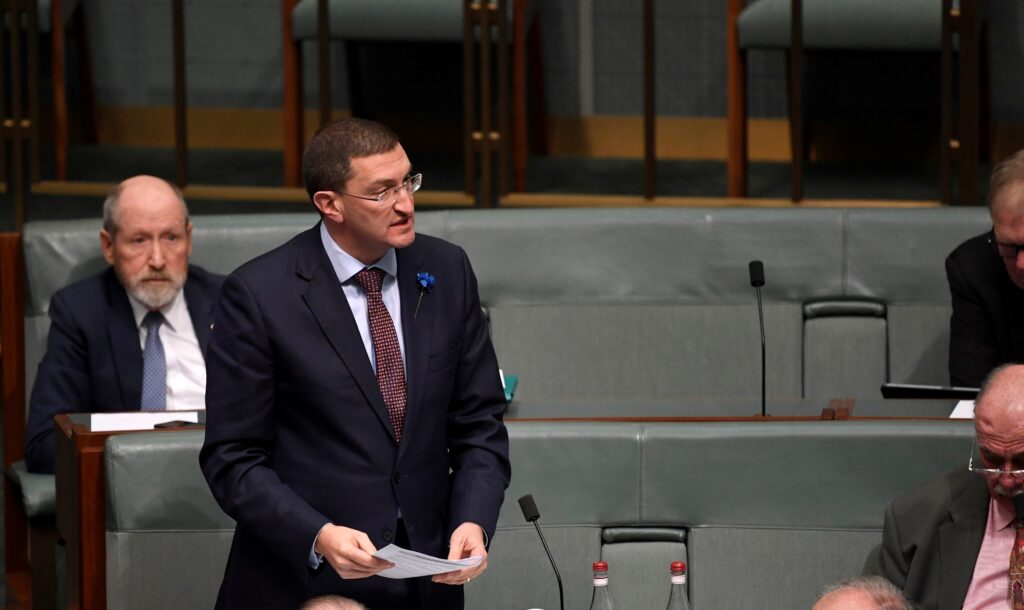The Coalition doesn’t oppose the Australian Human Rights Commission Legislation Amendment (Selection and Appointment) Bill 2022. The bill requires that appointments to the commission are made through a merit based and transparent process that is publicly advertised. The bill amends the Australian Human Rights Commission Act, the Age Discrimination Act, the Disability Discrimination Act, the Racial Discrimination Act and the Sex Discrimination Act to clarify that the maximum term of appointment for the president and commissioners is seven years, including any reappointments. The bill makes consistent qualification requirements for all commissioners by inserting a provision requiring the person to have appropriate qualifications, knowledge or experience.
The government is making these amendments at the behest of the Global Alliance of National Human Rights Institutions. Earlier this year, the global alliance threatened to downgrade Australia’s human rights body’s accreditation from an A status institution to a B status institution. Such a downgrade could mean that Australia’s human rights bodies might not be able to fully participate in some international fora. It’s worth looking more closely at the work of the Global Alliance of National Human Rights Institutions. Accreditation processes in institutions like these are really designed to assist developing countries without a strong history of independent institutions, not countries like Australia who have a very strong history of independent institutions but from time to time have become victims to the activist grievance politics of international institutions.
Some examples I will give in relation to the work of the global alliance’s accreditation arrangements demonstrate that the global alliance often applies its accreditation processes inconsistently and produces strange results. For instance, Sweden’s NHRI, the discrimination ombudsman, was downgraded to B status in 2011. The subcommittee determined its mandate was too narrow as it focused on equal rights but didn’t consider non-discrimination. The subcommittee was also concerned it lacked independence, because government appoints and can remove the ombudsman without clear criteria. So Sweden, despite its strong human rights record, has a B status NHRI.
Belgium’s national human rights institution, or NHRI, the interfederal centre for equal opportunity, was given B status accreditation in 2018. The subcommittee was concerned its mandate was too narrow as it didn’t cover the full range of human rights and was only responsible for combatting racism and discrimination. It acknowledged that, while in practice its mandate was interpreted broadly, it didn’t have clear legislative backing for a broad human rights approach. It noted also there was no legal provision that required the NHRI to participate in international human rights processes and that it failed to submit reports to all UN treaty bodies during Belgium’s periodic review.
In March 2022, in the same review that Australia was threatened with a downgrade, some other countries which seemed to excite the same criticism as Australia had received from the global alliance nevertheless had their A status confirmed. For instance, Benin was accredited for the first time. Benin was given A status despite the subcommittee expressing concern that its appointments weren’t independent or transparent. The report said the subcommittee:
… is of the view that the process currently enshrined in the Law is not sufficiently broad and transparent. In particular, it does not:
require the advertisement of vacancies for members;
establish clear and uniform criteria;
ensure that such criteria are uniformly used to assess the merit of eligible applicants; and
promote broad consultation and/or participation in the application, screening, selection, and appointment process for all members.
It sounds like the same criticism as the criticism made about Australia. Nevertheless Benin received A status.
Gambia was accredited for the first time and was given A status despite the subcommittee expressing concern that they were not provided with evidence of provisions or practices that ensure ethnic, geographic, religious and minority representation.
Austria was re-accredited with a status despite the subcommittee noting:
…that the process currently enshrined in the Federal Constitutional Law is not sufficiently broad and transparent. In particular, the process does not:
— Require the advertisement of vacancies, and
— Promote broad consultations and or participation in the application, screening, selection and appointment process.
Mexico was re-accredited with a status despite the subcommittee expressing concern that the enabling legislation was ‘silent on the criteria used to determine the suitability of the candidates’ and that ‘the grounds for dismissal of members of the Advisory Council are not specified in the Law’.
Germany also had it accreditation deferred, like Australia. The subcommittee found the mandate of Germany’s NHRI was too narrow too narrow because it did not have sufficient inquiry and investigation functions. The subcommittee was concerned vacancies weren’t publicly advertised. It advocated for uniform practices of publicly advertising vacancies and assessment of applications against predetermined objective and publicly available criteria. The subcommittee noted in practice terms of office were four years but this wasn’t specified in the relevant legislation.
You can see that there is a very different level of application of the work of the global alliance, and we shouldn’t genuflect uncritically to its work. But despite its shortcomings, it is important to maintain Australia’s membership of the global alliance so we can use our influence to reform those institutions. Australia’s ongoing position as a leader of human rights in our region and further afield ensuring that the Human Rights Commission can retain it’s A status accreditation. This will mean some important things for the Human Rights Commission and for Australia more broadly. It will mean that the Human Rights Commission can continue to have an independent voice in UN for a, including the Human Rights Council and some of the bodies of the UN General Assembly.
The Human Rights Commission provides an additional Australian voice in UN discussions on human rights on top of that of our professional diplomats who represent us in these bodies. The Human Rights Commission is also able to engage directly with its counterpart bodies, which allows us to show leadership in our region and continue to build human rights competence in NHRIs through collaboration.
In not opposing this bill we stand by the high-quality appointments to the Human Rights Commission that the coalition made in government. I particularly want to observe, note and thank them for the service and the contribution they have made to the discussion and protection of human rights in this country.
In particular, I want to acknowledge the President of the Human Rights Commission, Ros Croucher; the Sex Discrimination Commissioner, Kate Jenkins; the Aboriginal social justice commissioner, June Oscar; the disability discrimination commissioners that we appointed, Alastair McEwin and Ben Gauntlett; the Children’s Commissioner, Anne Hollonds; the Age Discrimination Commissioner, Kay Patterson; the Race Discrimination Commissioner, Chin Tan; and the three human rights commissioners that served during our time in office, Tim Wilson, Ed Santow and Lorraine Finlay. All of these people are distinguished Australians who made particular contributions to safeguarding and advancing human rights in this country and beyond. As the shadow minister for Indigenous Australians, I particularly want to commend the work that Tim Wilson did and was praised for by Indigenous leaders on Indigenous property rights. That is work that I wish to continue to pursue in my role as shadow minister.
I also want to take this time, while we’re talking about Australia’s role in international human rights, to outline the coalition’s strong international human rights record during the previous government. During the coalition’s term in office, Australia was a member of the United Nations Human Rights Council for three years. As a liberal democracy with a commitment to human rights, Australia delivered on key priorities during our term on the council. We spoke out against Russia’s attack on Ukraine and its people; against the Chinese Communist Party’s human rights violations in Xinjiang province; against deteriorating human rights situations in North Korea, Afghanistan, Ethiopia and Myanmar; against the erosion of human rights in Hong Kong; against the erosion of democratic institutions in Venezuela; and against the humanitarian toll of the conflicts in Yemen and Syria.
We led the Human Rights Council’s action on national human rights institutions, advocating for the protection of human rights defenders. We advocated for the rights of women and girls, and we championed equal rights for the LGBTI community. We encouraged Fiji and other Pacific countries to become members of the Human Rights Council. We spoke out against the notorious item 7 of the Human Rights Council agenda, which singles out Israel for special treatment. We were consistent in raising our voice to promote the rights of Indigenous persons, to oppose the death penalty and to advocate for freedom of expression, freedom of the media and freedom of religious belief.
Our three-year membership of the United Nations Human Rights Council came to a close at the end of 2020. However, the Morrison government continued to be guided by a commitment to strengthening the reach of international human rights, through our engagement as an observer at the Human Rights Council and the UN General Assembly Third Committee. To ensure Australia was actively engaging in the international system, then Prime Minister Morrison commissioned an audit by the Department of Foreign Affairs and Trade into Australia’s engagement in key multilateral institutions like the Global Alliance of National Human Rights Institutions—GANHRI. That audit, led by then foreign minister Marise Payne, examined Australia’s engagement in these institutions. DFAT’s audit recognised Australia’s immense contribution, noting that there was more to be done. It also acknowledged the pressure these bodies were under; there were times when their performance struggled to achieve their agreed obligations.
In the wake of that audit, our government recommitted Australia’s efforts to ensure global institutions were fit for purpose, relevant and accountable to member states. The coalition’s foreign policy mirrored this by supporting reforms in United Nations agencies and multilateral institutions to improve their transparency, accountability and effectiveness. The Morrison government directed its efforts to preserve three fundamental parts of the multilateral system: firstly, through rules that protect the sovereignty of nations, preserve peace and enable international trade and investment; secondly, by setting and adhering to international standards with regard to a range of issues that underpin the global economy; and thirdly, through the norms that underpin the universal human rights system and the rule of law.
A prime example of Australia’s international engagement was our role in seeking an independent review into the origins of the COVID-19 virus by the World Health Organization. A record 145 countries co-sponsored that resolution, in a significant moment of global consensus. Another example of the Morrison government’s commitment to human rights can be seen in its response to the situation in Afghanistan. When the Taliban overthrew the Afghan government in 2021, they committed egregious human rights violations. The Morrison government stood in solidarity with the Afghan people in the face of great hardship. The Taliban dismantled more than 20 years of gains in the area of human rights in Afghanistan. Then foreign minister Marise Payne affirmed the coalition’s support for Afghan people. She said:
All Afghans should be able to enjoy their fundamental human rights. These rights are indivisible and inalienable, expressed in international human rights law, and endorsed by all members of the United Nations.
Guided by the values of democracy, the rule of law, individual freedom and the rights of all to dignity and respect, the Morrison government committed $120 million to support immediate Afghan needs and humanitarian services. It also provided $20 million to support internally displaced people in Afghanistan and those neighbouring countries that were hosting Afghan refugees. The government’s package was designed to cater for the settlement of Afghan nationals fleeing the humanitarian crisis in Afghan. The Morrison government also committed to more than 30,000 places through the humanitarian and family visa programs to ensure the safe resettlement of Afghan nationals in Australia.
Not only was Australia a strong and unwavering advocate for the protection of human rights globally but we made critical reforms to our domestic law to ensure that we could continue to play our role supporting the international rules based order. An example of the Morrison government’s human rights policy reforms was the expansion of Australia’s autonomous sanctions laws through the Autonomous Sanctions Amendment (Magnitsky-style and Other Thematic Sanctions) Act 2021 and the Autonomous Sanctions Amendment (Magnitsky-style and Other Thematic Sanctions) Regulations 2021. These critical reforms gave Australia the ability to sanction individuals, as opposed to sanctioning states, for serious human rights abuses and violations. These reforms ensure that Australia may, where it is in our national interest, take action to impose costs upon, influence and deter those responsible for egregious situations of international concern but with a minimal impact on general populations.
In conclusion, Australia has a strong human rights record. This legislation will ensure that there is no impediment to the Australian Human Rights Commission participating in international fora to continue to advance Australia’s human rights agenda.




